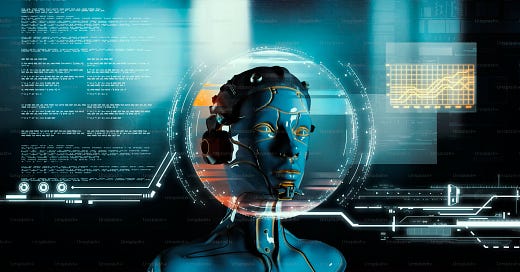The Mind Blowing AI Findings of Two Authors
…….Seeking an Even Deeper Perspective
There are many who believe that we may be at an existential tipping point with AI advancement…….
…..I happen to be one of them.
Just last week I watched a podcast with host Hala Taha where “Mo Gawdat: Ex-Google Officer Warns About the Dangers of AI, Urges All of Us to Prepare Now.”
Awestruck by what he shared, I’ve followed that up by listening to his audiobook “Scary Smart: The Future of Artificial Intelligence and How You Can Save Our World.
As though that wasn’t enough, I randomly stumbled upon the book Your Face Belongs To Us: A Secretive Startup’s Quest To End Privacy As We Know It by Kashmir Hill, tech reporter for the New York Times. It offers a stunning look at the work of AI facial recognition firm Clearview and its potential implications for the world.
In heading down the rabbit hole on this AI theme, I decided to reach out to author Max Borders, whose thought-leadership I have featured a number of times over the years. Back in June of 2022 in a Substack article entitled “Is A Global Economic Reset Eminent” we discussed the imminent changes taking place in our global world order and its potential impact on humanity.
Max Borders is the author of several books including The Decentralist, The Social Singularity and After Collapse. His newest book Underthrow doubles as the title of his popular Substack publication.
He is the Executive Director at Social Evolution , a non-profit organization dedicated to creating mutual aid societies to liberate people and solve social problems through innovation. Max is also the former Director of Content for FEE.org where he remains a contributing editor.
After reading and listening to an ocean of information about AI in recent weeks, I wanted to get Max’s take on where he thinks all of this is headed.
What sort of impact do you believe the rapid emergence of AI will have on statism as well as the future of humanity?
For me, there are a lot of ifs and buts — which are not like candy and nuts, apparently. Still, we might be okay if there’s more competition among AI projects, and these don't cartelize either through collusion or state regulation. Furthermore, if we can see a couple of viable open-source AI projects emerge, we needn't fear the centralization that AI, especially segregated AI, could enable.
Certainly, we can imagine AI corporations training their Large Language Models (LLMs) or other AIs in custom fashion for authoritarian functionaries, but in a way that restricts ordinary people from using that power. Such would result in a horrible power asymmetry.
With open-source alternatives, though, we might be able to compete against GovCorp, which will surely demand our subordination. But, if the government creates AI satrapies through regulation and subsidy, those AI oligarchs will not have our best interests at heart. They will almost certainly serve the most powerful.
What should freedom-minded individuals be pondering with respect to adapting to this new digital terrain?
We should all be learning how to use these tools while planning to migrate to open-source alternatives as quickly as possible. Maybe they'll enable us to self-organize and decentralize more readily.
I'm not terribly heartened that Alpaca was taken offline. Nor am I heartened by the idea that OpenAI is not open and is being heavily trained in critical social justice, for example, which is an illiberal doctrine that cannot solve the "alignment problem."
Remember the saying: We shape our tools, and then our tools shape us. Something similar can be said about centralized AI: They train their tools, and then their tools train us.
Yikes!
How do the recent developments in AI add to or alter the message you share in your book After Collapse?
So to recap the main parts of After Collapse, I worry too many factors are hastening the fall of the American Empire and, to some extent, our socio-economy. I set out my concerns in the seven chapters of Part One. Then, in Part Two, I suggest seven change vectors to decentralize and self-organize peacefully to evade the excesses of authoritarian power. Such will be necessary as the phoenix comes up from the proverbial flames. I refer to this as New America, a decidedly less imperial and less top-heavy version of the USA.
Now, what follows might seem like a rather strange, perhaps self-serving answer, but in many ways, After Collapse adds to my earlier thoughts about AI in the 2018 book, The Social Singularity. This book is my most successful to date, and I've changed my views very little.
Folks can read some of my most up-to-date writings on AI in "Dancing With Our Robot Overlords," though I have a bit more to add at my Substack. I will soon. But if I had to express my hopes for the future of AI in a few bullets, they might be something like:
AI does not yet possess or process local knowledge, which is subjective, human, and prompts our actions in unique circumstances.
AI, properly trained and applied, can help us facilitate decentralization, even as it seems to synthesize and centralize knowledge.
AI might not continue to improve exponentially; it might instead be an S-curve phenomenon—at least for a while.
AI is probably not going to be as dangerous as the people who wield it. Maybe we have time to figure out peace, prosperity, and morality before we put something so powerful into the hands of a sociopath eager to become Shiva, "destroyer of worlds."
Any concluding thoughts?
AI, especially an open-source form, could converge with better human incentive systems (such as distributed ledgers) and interface with our brains to let us become crypto cyborgs. This is the Elon Musk vision plus the Satoshi Nakamoto vision wrapped up to make a Max Borders vision that will probably cause some readers to turn and run. Still, this vision is better than an even more dystopian alternative—namely, one more closely resembling the Matrix.
I admit that the last one is out there, even for me. But I have a hard time imagining a world where we just ban AI and call it a day. The djinn is now out of the bottle. So how will we adapt? Answers to such questions turn in my mind. I hope I can prompt them to turn in the mind of others as well.







